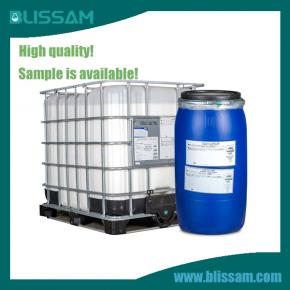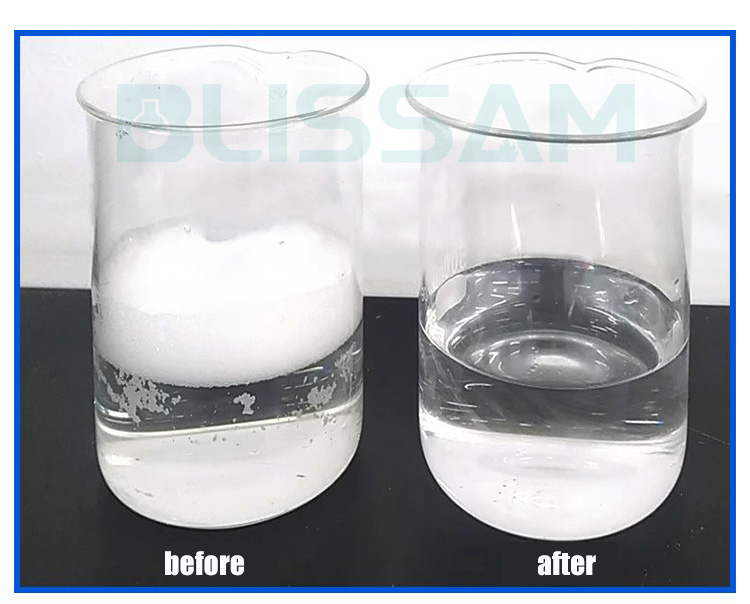In the food and beverage industry, maintaining high standards of quality and efficiency is paramount. One of the challenges faced in this sector is the unwanted formation of foam during processing. Foam can lead to numerous issues, including reduced equipment efficiency, inconsistent product quality, and increased production costs. To address these challenges, defoamer solutions are employed, playing a crucial role in ensuring smooth and efficient operations. BLISSAM, a leading provider of specialty chemicals, offers innovative defoamer solutions tailored to the unique needs of food and beverage processing.
Defoamers, also known as antifoams, are chemical additives used to prevent or reduce foam formation. Foam consists of trapped air bubbles stabilized by surfactants, which can be naturally occurring or added during processing. In food and beverage processing, foam can disrupt mixing, filling, and packaging operations, leading to inefficiencies and potential contamination risks. Defoamers work by breaking down the surface tension of the foam, causing the bubbles to collapse and dissipate.

Defoamers are formulated from a variety of ingredients, depending on the specific application and regulatory requirements. BLISSAM provides a range of defoamer solutions that are safe for use in food and beverage processing, ensuring compliance with industry standards.
A. Silicone-Based Defoamers
Silicone-based defoamers are widely used due to their effectiveness at low concentrations and broad applicability. They consist of silicone oils or emulsions that disrupt foam structure efficiently. These defoamers are particularly useful in high-temperature processes and can be used in products like juices, sauces, and dairy items. Silicone-based defoamers are valued for their ability to perform in various conditions without affecting the taste or quality of the final product.
B. Non-Silicone Defoamers
Non-silicone defoamers are used when there is a need to avoid silicone residues in the product. These defoamers can be oil-based, water-based, or powder formulations. They are often used in brewing, where silicone presence can interfere with foam stability in the final product. Non-silicone defoamers are also preferred in processes where silicone contamination could impact the sensory qualities of the food or beverage.
C. Powdered Defoamers
Powdered defoamers are ideal for dry applications or where liquid defoamers may be challenging to incorporate. They are used in products such as powdered soups, baking mixes, and instant beverages. These defoamers are formulated to quickly dissolve and act upon hydration, preventing foam during the reconstitution process.
A. Beverage Production
In beverage production, particularly in carbonated drinks and juices, foam can be a significant problem during filling and bottling. Defoamers help maintain consistent fill levels and prevent overflow, ensuring that products meet quality and packaging standards. In brewing, specialized defoamers are used to control foam during fermentation and filtration, preserving the desired characteristics of the beer.
B. Food Processing
In food processing, defoamers are used in various applications, including cooking, boiling, and fermentation. For example, in the production of sauces and soups, excessive foam can lead to inconsistent product texture and appearance. Defoamers are added to control foam formation, ensuring uniformity and quality. In dairy processing, defoamers are used to manage foam in milk and cheese production, preventing losses and improving processing efficiency.
C. Cleaning and Sanitation
Foam control is also critical during the cleaning and sanitation of equipment. Excessive foam can hinder the effectiveness of cleaning agents and make rinsing difficult, leading to potential hygiene issues. Defoamers help streamline the cleaning process by reducing foam, allowing for thorough and efficient sanitation.

BLISSAM's defoamer solutions offer numerous benefits to food and beverage processors. Our products are designed to be highly effective at low dosages, ensuring cost-effectiveness. They are formulated to meet strict regulatory standards, providing peace of mind regarding safety and compliance. Additionally, our defoamers are versatile, suitable for a wide range of applications, and customizable to meet specific processing needs.
Foam management is a critical aspect of food and beverage processing, impacting efficiency, product quality, and safety. Defoamer solutions provided by BLISSAM are essential tools in addressing these challenges. With a comprehensive range of products tailored to various applications, BLISSAM helps processors maintain optimal operations, ensuring that their products meet the highest standards of quality and consistency. As the industry continues to evolve, the role of defoamers will remain pivotal in enhancing the efficiency and sustainability of food and beverage production.
Contact:
Phone: +86-15957191858
E-mail: info@blissam.com
Whatsapp:+8615957191858
Add: A647, No. 9, Xiyuan Road, Xihu District, Hangzhou, Zhejiang, China
We chat
